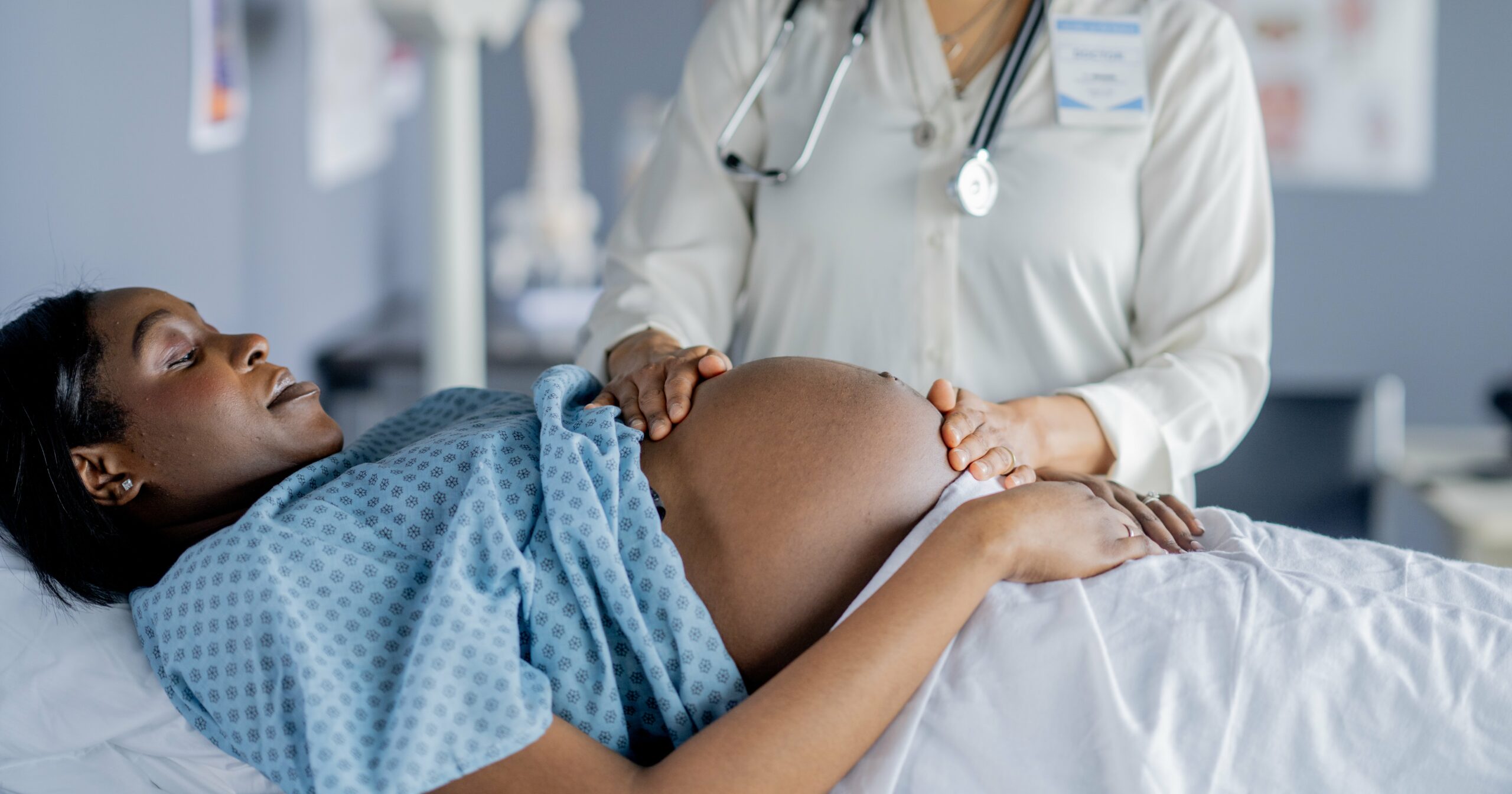In November, Donald Trump’s reelection marked a turning point: now, hard-won rights and advancements, particularly in maternal health and reproductive freedom, stand on the precipice of being undone. While many of us mourn the possibility of a new era with the first Black woman president, we know that we must rise up to protect our liberties. This moment carries the echoes of past policies and the promise – or threat – of their resurgence.
As the founder of Mama Glow, a global maternal health and education platform, my work involves training doulas and nurse care managers to provide life-affirming care and become the next generation of care workers that will transform our current maternal health landscape. Doulas are non-clinical care providers that offer emotional support, physical support, education, and advocacy tools to help expectant and new parents navigate pregnancy, birth, and the postpartum period.
As the transition of power begins, maternal health is among the critical issues coming into sharp focus. Our nation’s glaring maternal mortality rates remain a pressing concern. The future of fertility treatment and assisted reproductive technology is under threat. And without any federal protection for abortion access since the overturn of Roe v. Wade, many states have set their own draconian policies in place to ban this critical healthcare procedure.
As we prepare for a changed reality come Jan. 20, it’s important to understand the reproductive care most at risk – and how doula care can provide one of many paths forward.
Maternal Health Is Vulnerable, and Maternity Care Deserts Are Growing
The United States is among the most dangerous high-income nations in which to give birth. Not only is the maternal mortality rate higher than that of similarly-positioned nations despite advances in medical technology and healthcare access, but the birth disparities by race are stark and shocking. When compared to their white counterparts, Black women and birthing people are three to four times more likely to die of pregnancy and childbirth related complications. In harder-hit regions such as New York City or Washington, DC, this number is as large as five to 12 times. Black women continue to experience medical racism and obstetrical violence, which is correlated with Black maternal mortality and morbidity.
Moreover, we are observing the growth of maternity care deserts, or counties in which access to maternal health services is limited or absent. And it’s not simply rural areas but in major cities, including the nation’s capitol in the District of Columbia.
We need to continue to expand doula access to those in need.
The states with the highest percentage of maternity care deserts – North Dakota, South Dakota, Oklahoma, Missouri, Nebraska, and Arkansas – not only voted to elect Trump, but have consistently voted red in recent presidential elections. With a Trump presidency and increased fears about criminalization for providing life-saving care, medical providers, medical trainees, and other birthworkers are even more likely to turn away from working in states where their care is growing increasingly necessary.
The Future of Fertility Care Hangs in the Balance
The future of IVF is entangled in the GOP’s fight against bodily autonomy, fetal personhood, and abortion. Under a second Trump term, it’s uncertain what assisted reproductive technology will look like for the next four years and beyond.
When the Alabama Supreme Court ruled earlier this year that embryos must be considered protected children under state law, fertility clinics, hopeful expectants, and would-be families went into a frenzy. The legal, financial, social, and emotional consequences of this ruling will impact how people build their families for years to come, how providers will choose to conduct their care, and just shows how far reaching the consequences of the Dobbs decision are.
Heritage Foundation’s Project 2025 outlines a clear and evident stance on this issue: “Secure constitutional rights for embryos and fetuses under the Fourteenth Amendment.” Reproductive health is a continuum; fertility care, contraception, prenatal and postpartum care, abortion, miscarriage, and infant loss all exist on the same spectrum of reproductive health. If one part of this spectrum is under attack, all parts of it are affected and at risk.
Restricted Abortion Access Will Keep Leading to Tragedy
Abortion and miscarriage care exist in a delicate balance that is not widely discussed with nuance. As a practicing doula, my role with clients not only included preparing them for birth and providing education and emotional support, but also helping them navigate the challenging aspects of the reproductive journey. Over the years in my practice, there were many cases where there were clients planning to have a baby that they very much wanted, and the pregnancy needed to be terminated for health reasons.
The criminalization of abortion has ultimately blurred medical distinctions and left doctors and other care providers with the looming threat of being prosecuted for performing what should be routine medical management. We do not have to guess at the potential tragic health implications – we are observing them play out in real time in various states across the country. Josseli Barnica of Texas died after being told that intervening in her miscarriage would be a crime. Avery Davis Bell of Georgia recently recalled bleeding in a hospital bed as she faced delays in life-saving care to treat complications of her miscarriage. And there is the case of Brittany Watts, a 34-year-old Black woman from Ohio who was charged with a fifth-degree felony for abusing a corpse after she miscarried alone in her bathroom.
It’s clear that these tragedies will continue in states with abortion bans. And while Trump has said he does not support a national abortion ban, there are still ways his administration could restrict access. After all, he’s the president who vowed to overturn Roe – and did. He has also supported the idea of national abortion restrictions in the past.
Meaningful Ways We Can Protect Reproductive Health and Freedom
Despite the challenges posed by the continual erosion of reproductive freedom, there are steps that we can take to protect ourselves and our families and our futures. During pregnancy, I encourage clients to build strong support networks – what we at Mama Glow like to call “the birth village.” We must build our villages of strong support networks of trusted healthcare providers, family members, community leaders, advocacy groups, and local electeds. Solutions are always grounded in community.
Additionally, it will benefit us to go beyond preexisting models of care and expand our knowledge of local resources such as birthing centers, maternal health organizations, doulas, community health workers, physicians, and midwives to ensure access to care under any and all circumstances.
We need to continue to expand doula access to those in need, in particular to people of marginalized identities who tend to trend high risk. Doulas, as non-clinical professionals, improve maternal health outcomes, including helping to achieve reduced physical and psychological trauma, shorter labor times, fewer cesarean sections, and increased maternal satisfaction after labor. Doulas can help pregnant clients develop self-trust and the confidence to navigate the birth process, as well as teach folks how to advocate for themselves. Doulas are not only important companions to have during pregnancy and postpartum, but very helpful for folks during the fertility period and incredibly supportive during the challenging and isolating time when someone is navigating miscarriage or abortion.
Doulas can also hold your hand and help you understand how our complicated medical system works. Contact your insurance provider to see if they cover doula support, and ask your HR department if you can use FSA or HSA to pay for doula services. If you are uninsured, there are many free local and state programs for Medicaid-eligible pregnant patients where you can access pro bono doula services.
Or, be part of the change and become a trained doula to advocate and be a presence of support along the reproductive continuum. Investing in the doula workforce by training and professionally developing more doulas to serve along the perinatal health continuum is key. Since 2018, Mama Glow has trained over 3,000 doulas across the United States and six continents. We have trained nurse care managers in doula competency to ensure that more care providers have the skills that doulas bring and can work more harmoniously with doulas within the healthcare system.
Most of all, remain hopeful. Our longstanding resilience continues to provide hope for a new future, one where birth is safe, healthy, dignified, and affordable. Where everyone has the right to abortion access that is safe, private, and respectful. Where everyone has the right to create the family configurations of their choice and ability. And where our value is not confined to or defined by the contents and function of our uterus. And remember, regardless of who is in office, our work towards liberation does not end.
Latham Thomas is a maternal health expert, professor, author, and founder of the global maternal health and education platform Mama Glow. She is is dedicated to improving maternal health outcomes through education, workforce development, and community engagement.



